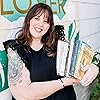Janet Fitch
The best thing about being a writer is being able to create and live lives which are very far from my own. As a human being, I am limited to just this one life, and I try to live it sensibly, I"m sadly a very average person. As Flaubert advised, I live a conventional life so I can live the wild life of the imagination. I disappear in my writing, becoming the punk rock queen, the suicidal young artist, a foster child, her crazy mother, a young Russian woman living through the Revolution.
Of course, this is also what a reader does. A great reader gets to live so many lives. But as a writer, I live each scene I'm writing, not for minutes, but for weeks. I am so passionate about this. That's the best part, the totality of it. I"m an absolutist, a completist, an obsessive, a marathoner. I don't like to start things, but once I do, I don't like to stop--perfect temperament for a novelist.
Another best thing is just handling the materials--the beauty of language the richness of its possibilities. I love words, putting them up against each other to see how they build, their music, like shimmering colors and scents and textures. Oh, the pleasure of sculpting a really beautiful sentence! That rush of surprising myself with an interesting word, a great cadence, an unusual juxtaposition, the perfect metaphor. I'm easily bored, and when I've mastered a skill, I'm usually done with it. But in fiction, you never master anything. You're always a beginner, you're creating everything fresh in that moment. It's always new. There's no upper limit in artistic aspiration, you never "get there." So it's continually engaging.
Best in a different way is when people read my books and I get to see all the time and energy that I've packed into every sentence, all that distillation, all that compression, blossom inside a reader, see that it's real. Not just my experience writing the book, but seeing that transfer of an intense experience. What a thrill that is!
And being a writer gives me a reason to slow down and really look at the world, look twice at that cluster of trees, now, how would I describe that? What colors are in play, how would I describe the movement of those branches, the pattern of light and dark, the texture of the trunks, the shadows moving on the ground, the feeling of desolation or tenderness or comfort?
It also gives me tools with which to think about my beliefs about life. Usually I don't even know what I think is true until my characters face various tough circumstances--and I can see, oh, really, this is what happens in cases like that. Meaning, this is what I really believe, not what I espouse to believe over a glass of wine at a party. it's not always the same, I'm much more honest in my fiction, I have to be, or it won't stand up. I get to know the world, and I get to know myself.
Of course, this is also what a reader does. A great reader gets to live so many lives. But as a writer, I live each scene I'm writing, not for minutes, but for weeks. I am so passionate about this. That's the best part, the totality of it. I"m an absolutist, a completist, an obsessive, a marathoner. I don't like to start things, but once I do, I don't like to stop--perfect temperament for a novelist.
Another best thing is just handling the materials--the beauty of language the richness of its possibilities. I love words, putting them up against each other to see how they build, their music, like shimmering colors and scents and textures. Oh, the pleasure of sculpting a really beautiful sentence! That rush of surprising myself with an interesting word, a great cadence, an unusual juxtaposition, the perfect metaphor. I'm easily bored, and when I've mastered a skill, I'm usually done with it. But in fiction, you never master anything. You're always a beginner, you're creating everything fresh in that moment. It's always new. There's no upper limit in artistic aspiration, you never "get there." So it's continually engaging.
Best in a different way is when people read my books and I get to see all the time and energy that I've packed into every sentence, all that distillation, all that compression, blossom inside a reader, see that it's real. Not just my experience writing the book, but seeing that transfer of an intense experience. What a thrill that is!
And being a writer gives me a reason to slow down and really look at the world, look twice at that cluster of trees, now, how would I describe that? What colors are in play, how would I describe the movement of those branches, the pattern of light and dark, the texture of the trunks, the shadows moving on the ground, the feeling of desolation or tenderness or comfort?
It also gives me tools with which to think about my beliefs about life. Usually I don't even know what I think is true until my characters face various tough circumstances--and I can see, oh, really, this is what happens in cases like that. Meaning, this is what I really believe, not what I espouse to believe over a glass of wine at a party. it's not always the same, I'm much more honest in my fiction, I have to be, or it won't stand up. I get to know the world, and I get to know myself.
More Answered Questions
Dawn Richard
asked
Janet Fitch:
Hi Janet! I'm an huge fan of White Oleander and am currently re reading it at the moment. I wanted to know what advice you have for young writers that 1. have trouble making time to write/committing to completing a book and 2.trying to get published? Thanks so much for your advice and thoughts. Dawn
Kat
asked
Janet Fitch:
Hi Janet! I've read "White Oleander" 10+ times now; it seems I need to read it yearly. It's truly my favorite novel, and one of my favorite parts is when Astrid is considering Claire's pearls and wishes her life could be knotted like a pearl necklace so even if something broke, the whole thing wouldn't come apart. Do you recall a particular line or passage from a book you've read that resonated strongly with you?
Paul Richardson
asked
Janet Fitch:
Janet: Fascinated to hear about your new book. Will definitely call out to the interview on our FB page... Perhaps you have heard about our project? For The Children of 1917, we (Russian Life magazine) traveled thousands of kilometers around Russia, interviewing Russians born in 1917. Oh, the stories they had to tell. Look forward to reading your book. Best, PR
About Goodreads Q&A
Ask and answer questions about books!
You can pose questions to the Goodreads community with Reader Q&A, or ask your favorite author a question with Ask the Author.
See Featured Authors Answering Questions
Learn more





